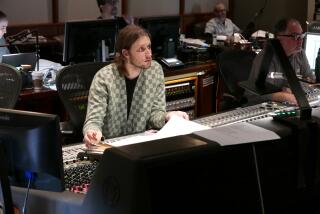More Questions Than Answers : The Finals of the Pogorelich Piano Contest Begin at Ambassador
- Share via
Contests are a necessary evil. Some observers would say they’re not even necessary.
Art isn’t like commerce. At least it shouldn’t be. Artists shouldn’t be measured against each other, as if they were refrigerators.
When they are measured against each other, the results are seldom conclusive. A few winners go on to glorious careers. Many go on to oblivion. Some losers end up doing much better than the winners.
Still, contests are useful public-relations gimmicks. Everyone loves a good Cinderella story. Everyone wants an instant hero. Everyone enjoys a dramatic race.
And so it goes these days in glamorous Pasadena where the Ambassador Foundation and, by association, the Worldwide Church of God, are hosting the first Ivo Pogorelich International Solo Piano Competition.
Pogorelich, the 35-year-old virtuoso from Belgrade who heads this project, has had his own, much publicized trials and tribulations in the competitive circuses. In several recent interviews he has claimed that some of the big Iron Curtain contests of recent decades were rigged. His own contest, he promised, would be different--free of political interference, free of age limits, free of repertory constraints, free of anti-humanitarian impulses.
It sounded nice. Naive but nice. Still, the Pogorelich contest, like all its predecessors, has inspired a good deal of backstage grumbling.
Some experts were surprised that the makeup of the international jury was kept a secret until the day before the first round. When the roster was finally announced, veterans of both foreign and domestic wars found it oddly constituted at best, lightweight at worst.
A noted artists’ manager in attendance, Maxim Gershunoff, charged cronyism. The names of famous teachers and performers were scarce, in any case, and some of the judges’ credentials seemed inflated. The 13-member panel includes only three Americans, two of whom find primary employment as radio announcers.
More disturbing, however, were recurring worries about nepotism. To serve as president of the jury, Pogorelich appointed his wife, Alice Kezeradze, identified in the puffy program book as a pianist with “a brilliant concert career” and “an outstanding pedagogue.” She would function as an active, voting president, and she was given veto power over her colleagues.
Troubles began, as always, as soon as the first contestants were eliminated. Several of the instant losers were artists already enjoying distinguished careers, but that happens. One person’s Cliburn is another’s Votapek.
Among the predictable cries of distress, however, one heard strange accusations regarding Kezeradze. One contestant, speaking on condition of anonymity, claimed that four colleagues in the competition had studied with the jury president, and that one of them was related to her--possibly a niece.
Specific queries about these matters were duly addressed to the Ambassador information officer. After checking the matter out, he said only Pogorelich could answer, and would do so during the first intermission at the finals, Monday. Later he said Pogorelich would be too busy to speak to the press. Meanwhile, Kezeradze said her husband would speak to the press, but she herself could do so only after the contest was over.
After four hours of obfuscation, an angry Pogorelich agreed to an impromptu all-too-public chat when encountered on the steps of the auditorium.
*
“I am ashamed to be shaking your hand,” he shouted upon being introduced by the information officer. Finally, he and his wife grudgingly answered a few quick questions.
The jury list was kept secret, according to Pogorelich, “because we didn’t want the press to speculate . . . (and) it isn’t important for the contestants to know who the judges are.” Kezeradze reluctantly confirmed that one finalist, Eteri Andjaparidze, was her second cousin, and that another finalist, Avo Kuyumjian, had participated in one of her classes. She denied pedagogical involvement with any other contestants. Pogorelich dismissed questions regarding possible relationships between contestants and judges as “not relevant.”
Backstage controversies seemed to affect the performances on Monday only in matters of scheduling. What should have been a mere four-hour marathon turned out to be an endurance contest involving three full recitals lasting a total of six hours and 20 minutes. The extension was necessitated by the judges’ decision to advance eight pianists to the final round, which ends today, rather than the six originally scheduled.
It was a long, trying night, both for players and listeners. But it did introduce three worthy, drastically disparate talents.
Eteri Andjaparidze, a 37-year-old Georgian now living in New York, turned out to be the most erratic, the most mannered and certainly the most willful of the three. Avo Kuyumjian, a 34-year-old Austrian from Lebanon, revealed a strong technique and a mellow romantic temperament. Olivier Cazal, a 31-year-old Frenchman who inherited the unenviable task of coming last, salvaged what he could with elegant flamboyance.
*
Notes from a critical diary:
6:05 p.m. : Andjaparidze, unsmiling and ultra-severe in a black pantsuit, does some alarming pounding on the Hamburg Steinway on behalf of some warm-up Scarlatti. In Beethoven’s C-minor Sonata, Opus 111, she vacillates between exaggerations: strident fortes at one extreme, feathery pianissimos at the other.
Schumann’s C-major Toccata, Opus 7, gives her steely fingers an exhilarating if stormy 10-minute workout, after which Chopin’s Prelude in C-sharp minor provides a welcome calm. Finally she turns Prokofieff’s Sonata No. 7 in B-flat--a fist-busting challenge chosen by all three contestants--into a massive flight of grotesquerie occasionally offset with somber lyrical indulgences.
8:10 p.m. : Kuyumjian--calm, bespectacled and seemingly shy--opens with the same Scarlatti sonata on the same Steinway, but makes it a study in refinement. He brings comparable introspection and warmth to the ruminations of Schumann’s “Kreisleriana,” nimble charm to the agitation of Weber’s “Perpetuum Mobile.” Despite some loss of control in the big climaxes, he ennobles Schubert’s Two Impromptus, D. 935, with understatement and delicate shading. Finally, he proves that restraint can work just as well as passion when taming the Prokofieff monster. Moderation would seem to be his password.
10:30 p.m. : 10:30 p.m.! The audience has shrunk considerably, and continues to do so. Undaunted, a dapper Olivier Cazal plays as if lives were at stake. Significantly, perhaps, the firebrand chooses the bright and crisp-sounding Yamaha rather than the darkly resonant Steinway.
He breezes through a Haydn sonata, plays Ginastera’s “12 American Preludes” with cool, rugged, splashy authority, then, in the vast stretches of Schumann’s C-major “Fantaisie,” Opus 17, proves that he commands a touch of the poet. In the Prokofieff valedictory, he manages to find a telling middle ground between Andjaparidze’s theatricality and Kuyumjian’s musicality.
12:20 a.m. : Those who stay to the not-so-bitter end respond with a standing ovation. The player looks relieved. The judges look tired.
More to Read
The biggest entertainment stories
Get our big stories about Hollywood, film, television, music, arts, culture and more right in your inbox as soon as they publish.
You may occasionally receive promotional content from the Los Angeles Times.










